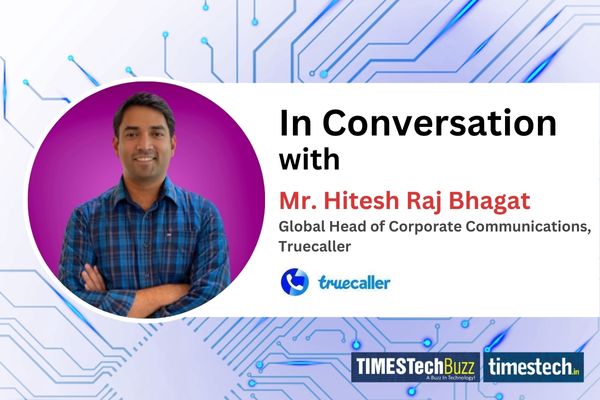In a recent interview with TimesTech, Hitesh Raj Bhagat, Global Head of Corporate Communications at Truecaller, sheds light on the company’s innovative solutions, commitment to user privacy, and strategies for building trust in communication.
Read the full interview here:
TimesTech: What distinguishes Truecaller in contact verification and blocking unwanted communication, particularly in high-fraud areas?
Mr. Hitesh: There are some other caller ID apps available. However, Truecaller does much more than just identifying unknown calls. The service was founded in 2009 by Nami Zarringhalam and Alan Mamedi with the aim of solving a very real problem of unknown caller identification. But over the years, the service has been constantly evolving.
With constant feedback from users and the intent to serve as a more useful solution to multiple problems, we have introduced things like Smart SMS, SMS fraud alerts, business verification services, an AI-enabled Assistant to answer your calls for you, Call Recording with detailed voice to text transcription and so on. Truecaller also places a lot of emphasis on women’s safety, having done multiple studies to ascertain the causes and solutions.
During the peak of Covid 2nd wave, Truecaller joined hands with the Government and helped the Ministry of Home Affairs by marking hundreds of numbers pretending to be sellers of life saving medicines and oxygen. We have been closely working with multiple state governments and training police forces on cybersecurity to combat the growing incidents of cybercrime, impersonation, and fraud, and promote user safety in digital communication.
TimesTech: How does Truecaller ensure user data privacy while serving millions of users worldwide?
Mr. Hitesh: We take user privacy very seriously. At the core of Truecaller’s mission is the commitment to building trust in communication. From its inception, Truecaller has placed data privacy at the forefront of its priorities, recognizing the inherent responsibility that comes with handling users’ personal information. One of the fundamental ways Truecaller demonstrates its commitment to user privacy is by asking for permissions only when necessary.
Users have the autonomy to choose which permissions to grant, whether it’s access to location, camera, or microphone, based on their individual preferences. Moreover, users retain the ability to deactivate these permissions at any time, placing control firmly in their hands. Our detailed support pages, TrueTalks Community, official Truecaller Blog and dedicated support team will always clearly communicate the importance of permissions, why certain permissions are needed, how to disable the ones you don’t need and so on.
TimesTech: Can you detail Truecaller’s initiatives to establish trust in communication and become a trusted platform?
Mr. Hitesh: There are a few key ways we build trust. We will always communicate clearly with our users, media and other stakeholders about how the app functions, how we earn revenues and about aspects like app permissions. We will always respond well to any and all questions, especially concerning privacy, data safety and security. And finally, we will always demonstrate our resolve to solve the global issue of spam and scam with third party reports, partnerships and affiliations with both private and government bodies.
And you will see many such examples over the years from Truecaller. Just to cite a few examples: The Government Services directory inside the app has over 25,000 verified government numbers, listed state-wise. Most important government services are whitelisted and verified on the platform. We regularly partner with police authorities on cyber safety trainings that have created widespread awareness among users, leading to a trusted community of millions worldwide.
In addition, Truecaller is probably among the very few apps that you will see with complete and granular control over privacy and data, given to each user, within the app itself.
TimesTech: How do you develop communication strategies for Truecaller across diverse regions and cultures?
Mr. Hitesh: Truecaller is really for anyone with a data connected smartphone. If you keep that in mind and our staggeringly high user base of 374 million globally, you will realize that we need to cater to so many different regions, languages, telecom providers and a huge variety of smartphones. Even within India, we support all the large regional languages. This means we also need to speak to our consumers in their language – and we do!
We design our communication strategy very thoughtfully and always aim to time it with current scenarios and trends. Several times, our approach is to launch a feature in India first and then roll out to the rest of the world. Other times, we launch globally or launch only in a small, test market before going mainstream. Accordingly, we utilize different strategies and tools and also take external help from different agencies to achieve our goals.
TimesTech: How does your background in technology journalism aid in communicating Truecaller’s value proposition?
Mr. Hitesh: In many ways, journalism and corporate communications are two sides of the same coin. When my manager first reached out to me, the brief was simple: to help build bridges between the media and Truecaller. And for this reason, he only wanted someone with a high number of years of experience on the journalism side. I have steered our approach into being more approachable and friendly as a company and we are grateful for the media support we have received over the years. In addition, Truecaller was a company I always keenly followed because of the innovation on offer and the high impact it had on my life personally. When the opportunity came along, I didn’t hesitate.
TimesTech: How has Truecaller’s status as a publicly traded company impacted its strategies and approach to innovation?
Mr. Hitesh: Not much changed after we went public. I have been with the company since 2019, before we went public. Of course there are certain regulations to follow now and regular updates for our shareholders, publicly available quarterly reports and so on. But we were small, nimble and profitable before going public – and the same remains true today. Our mission of making all communication safer remains the same, and the strategy (improving existing offerings, innovating new product features based on consumer feedback) remains the same too.















